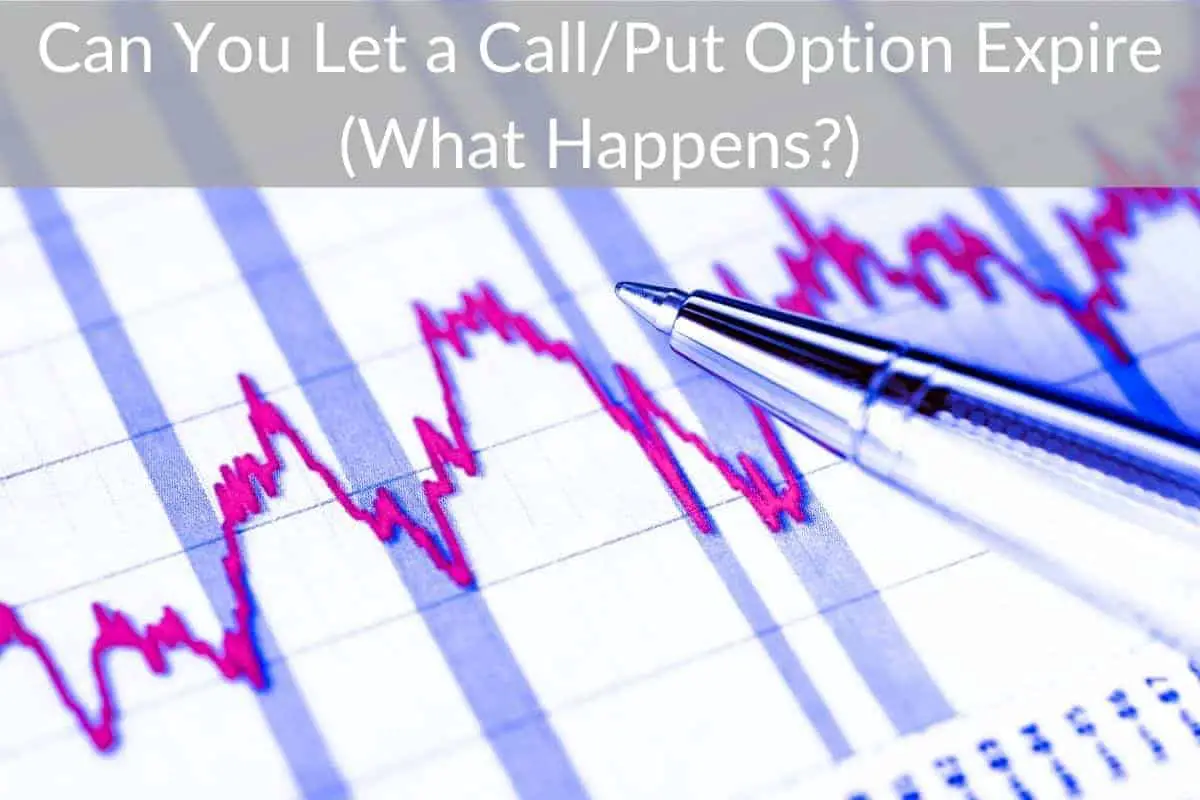Table of Contents
*This post may contain affiliate links. As an Amazon Associate we earn from qualifying purchases.
Call/put options are financial contracts that allow the investor to buy/sell assets for a defined price within a specific time frame. The investor can profit when the underlying asset changes in price.
But what happens when you let the option expire?
You can let a call or put option expire. If a call option expires when it is in the money, your broker usually automatically exercises it or sells it. If the option is out of the money, it will become worthless at expiration and is removed from your account.
In this article I will explain what happens to a call/put option once it expires, depending on a few factors. You will also learn whether you should let options expire, or some other alternatives that could be better.
How Can a Call/Put Option Expire?
Call options allow the buyer to purchase 100 shares of a particular stock for a defined price and within a specified date range.
On the other hand, put options allow the buyer to sell 100 shares of a particular stock for a defined price and within a specified date range.
An option expires when the final date when it is valid passes. If it expires ITM, it has some intrinsic value and the buyer can purchase shares for a lower price or sell the option for a profit. If an option expires OTM, then the option buyer will lose everything that they paid for it.
In The Money Options
When an option is in the money or ITM, it means that it has some intrinsic value. For a call option to be in the money, its strike price needs to be lower than the asset’s current price. When the call option is ITM, the buyer can purchase shares for a lower price than he would on the open market.
For a put option, the strike price needs to be higher than the underlying asset’s current price for it to be considered ITM. This option has value because its owner can sell his shares for a higher price than he would on the open market.
What Happens if Option Expires in the Money?
When an option that holds intrinsic value or is “in the money” expires, it is usually automatically assigned to your account as shares or money that you get for selling the shares (for a put option). Some brokers will also automatically sell the option a certain amount of time before the market closes
Even though most brokers will automatically handle your expiring options or notify you if the ITM options you hold will cause a negative margin impact, you should always be aware of the positions you’re holding and not rely on your broker.
For example, there could be a problem if you do not have enough money in your account to buy or short sell the stocks, so you need to make sure that you adequately fund your account to avoid this.
Out Of The Money Options
In some cases, the option may have no value, so it becomes worthless. For a call option, this happens when the strike price is higher than the underlying asset price. Put options are “out of the money” when their strike price is lower than the underlying asset price.
For active traders, OTM can be of great value since it provides excellent leverage if the trader buys the option when it is OTM, the percentage gain will be much more significant if the option eventually becomes iTM.
Since it is more likely for an out-of-the-money option to expire with no value, it is better to sell OTM call or put options. That said, selling options is never ideal because the added leverage they provide only works for option buyers.
This is especially true for OTM options where the maximum profit you can get is limited, while the loss potential can be severe.
What Happens If An Option Expires Out Of The Money?
Different things can happen when an option expires OTM, depending on whether it is a call or put option.
When a call option expires OTM, as a buyer of that option, you will completely lose any premium that you paid when purchasing it. If you’re a seller of a call option that expired OTM, the stock will remain with you, and you can then resell the call again if you wish.
If a put option expires OTM, as a buyer, you will lose the premium you paid for purchasing the put option. If you’re the seller, you will not be obligated to buy the stock (have it put to you).
When Should You Let An Option Expire?
If you are trading European options, you can only exercise them at expiry. However, you can exercise American options at any point between purchase and expiry, which begs the question of whether you should wait or not?
You should generally avoid letting options expire. Options can lose their value quickly the closer they are to expiration. Ideally, you should settle your options within ten days of expiry.
That way, you will also avoid the margin call that you would have to pay if you don’t have enough money in your account if the broker automatically exercises it for you.
Sometimes, you may also want to sell an option if there is an opportunity to make a more significant profit that way. Whether you exercise a call option or not depends on your expectations for the price of the underlying assets.
If you expect the price to increase, you should exercise or hold the option. If you expect the price of the underlying asset to drop, you should try to sell the option and take your profits instead.
Final Thoughts
Call and put options can expire. Once that happens, there are a few possible outcomes.
If the option expires in the money, your broker will usually automatically exercise it if you have enough money in your account or they can sell it. If an option expires out of the money, it becomes worthless and is deleted from your account.
Since options tend to lose their value closer to their expiration date, it is best to sell them within ten days of their expiry date. At that point, you could either exercise the option or sell it but most people (and in most situations) will just sell the options.

